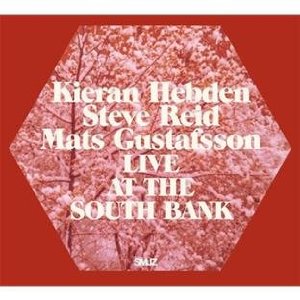Superficially, the pairing of Kieran Hebden and the late Steve Reid was an unlikely one. Reid had been drumming for almost twenty years before Hebden was even born, with everyone from Martha and the Vandellas to Sun Ra Arkestra. Hebden was the ex-post rocker who’d broken free of the usual accusations of electronica being ‘cold’ and ‘soulless’ via free-ranging, imaginative music, built from a palette including field recordings, live percussion and musique concrete. He was lumbered with the clumsy portmanteau ‘folktronica.’ Reid is quoted saying theirs was "a special relationship, like Miles and Coltrane, or Dizzy and Bird." Incredible praise on the surface of it.
Dig a little deeper and you realise this was a match made in heaven, both wildly enthusiastic experimenters, rhythmically minded, equally at home locking in to a groove as taking you on an unexpected detour. Often experimental for experimental’s sake, but disciplined enough to rein it in before self-indulgence set in. Reid held the ‘ancient wisdom’ that can only come from a lifetime of experience, and was the perfect foil to the esoteric and technological as represented by a younger generation in the form of Hebden.
Live From South Bank has the feel of an extended freeform jam. Opener, ‘Morning Prayer’ slides around with Reid’s loose and splashy cymbal work giving way to Hebden’s pulsating electronics, before the drums reassert themselves with some sharp snare work. Both facets jostle for attention before settling in to a pulsating partnership; it might be the perfect distillation of the two apparently disparate elements at the heart of this pairing. ‘Lyman Place’ announces Mats Gustafsson’s ‘power sax’, a whinnying horse at times, or a goose, or pig. From discordance to working a rolling groove, it is the perfect tool to break up a cosy jazz love-in, a welcome element of tension and antagonism. ‘Untitled’ is classic Four Tet territory, enlivened by the insistent drums nipping at the melody’s heels as Gustafsson conjures the spirit of kosmische, building to a terrific climax. Rolling grooves sit comfortably alongside the spiritualist wail, and angular funk, of ’25th ‘Street’ before everything slots neatly in place for ‘The Sun Never Sets’.
This partnership coincided with Hebden’s records becoming, if not more straightforward, then certainly, more dance-floor conscious. Ringer cleaved to techno’s insistent rhythms, discarding a little too much of his warmth. There is Love in You perfectly balanced these new, more insistent rhythms with a loose and light touch. It was as if working with Reid gave him the perfect pressure valve with which to release his more unorthodox urges.
Hebden was first inspired to partner with a drummer whilst watching Mats Gustafsson, and this record (the first time the three of them played together) sees that idea come full circle. Probably the last recording of Reid playing live, before his death in April 2010, it is a fittingly energetic and exuberant performance. Hebden himself summed it up best, looking back on the concert and saying "I had as much fun playing that night as I’ve ever had playing music."


